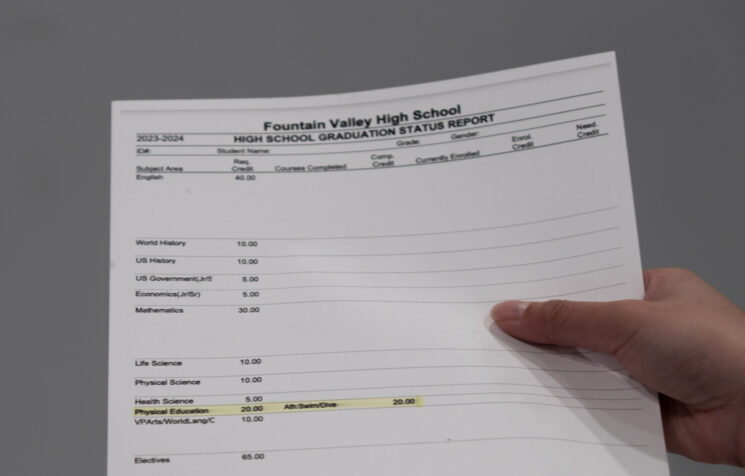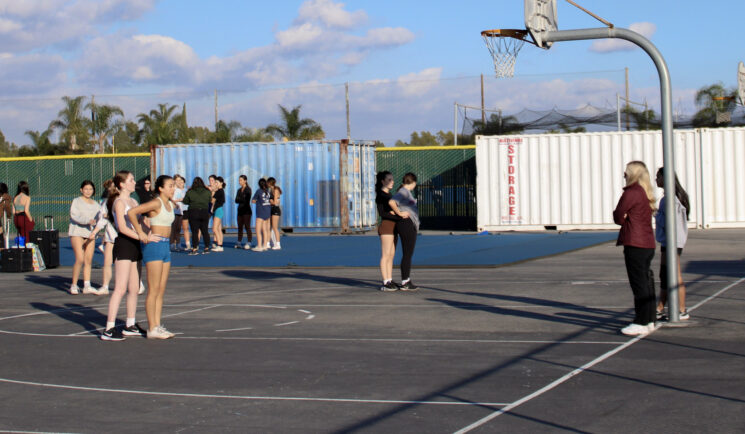
By Uy Pham
Every year-long class at Fountain Valley High School (FVHS) provides students with 10 credits toward graduation if students pass the class.
There are two typical class structures at FVHS. The traditional, in-person course meets for 55 minutes a day, five days a week. The hybrid course may meet only a few times a week, but students still complete the same time of instructional work as the traditional courses.
Then there are the athletics classes, typically held during sixth period. For athletics, credit is awarded based on a quarterly system, with 2.5 credits awarded per quarter. The class can act as a PE class, in replacement of traditional PE for freshmen and sophomores, or elective credit for upperclassmen.
However, some of these sixth period athletics classes may not meet every day for the same amount of time as other traditional academic classes. Some programs allow their students to leave early when there is no practice.
“Athletic classes meet the required minutes for a class. Due to the nature of sports practice schedules, they do not align perfectly to the daily [period six] schedule as a [period six] academic class does.”
Assistant Principal of Guidance Casey Harelson
But, are students still supposed to be in school during the scheduled sixth period? Is the school and teacher of that athletic PE class still responsible for the safety of students during the sixth period minutes?
For hybrid courses, students and their families are required to sign contracts acknowledging the scheduled in-person meetings of the course. On the days when students are not meeting in person, the responsibility of safety and learning falls on the student and families, not the teachers and school.
Baron Banner obtained the policy that both student-athletes and their families sign while completing athletic clearance for sports participation.
“It is understood that practice may be held at a time other than the assigned class period listed on the student schedule. Each sport dictates practice times for their sport, which may or may not be held during a normal bell schedule for sixth period on any given day. Our student-athletes are required to attend all scheduled practices and games for the sport they are enrolled in, as this is a graded class,” the policy reads.
The policy also mentions that any unexcused absence from a game or practice will be considered truancy. Furthermore, when there is not a game or practice during sixth period, the time after a student’s last academic class is considered non-school hours without the supervision of school staff pursuant to Education Code 44808.

Different sports’ practice schedules
For some sports, student-athletes are required to meet for practice almost every day, both during the season and off-season.
“We would often practice six days a week practically the whole year. If our coach tells us we have practice, then technically [we are required to attend],” varsity cross-country captain Ethan Kwong said. “It’s just like practicing anything else. Practice doesn’t make you perfect but it makes you better.”
Other sports alternate practice schedules between off-season and during-season requirements.
“During season, we usually had away games on Monday, weight room on Wednesday, and home games on Friday. Otherwise, we had turf practice until 4:15 p.m. Off-season practices are two days a week from 2:30 p.m. to 4:00 p.m.” varsity field hockey captain Ayat Shehadeh said. “I believe daily practices during the season keep the team motivated to continue improving knowing there is an upcoming game. [For] offseason practices, I believe energy and motivation is lost, but we still look forward to next season.”
Some sports that alternate schedules during the season and off-season permit exceptions for club players who have conflicting club sports practice schedules.
“Last year, off-season was after school for around an hour, usually during sixth period. We would just do things to keep ourselves in shape, occasionally playing,” volleyball player Rachel Nguyen said. “If people had club practice, you had the right to leave early … it was still strongly advised to go [to off-season] no matter what.
Another situation for sports practices is that a sport does not have an off-season program, such as both golf programs. Therefore, underclassmen athletes need to meet PE credits and enroll in a regular PE class in the semester without their athletic sport.
Lastly, in past years, members of the swim team were able to sign a club form, permitting them to use club swim practices in place of high school off-season practices, while still receiving graduation credit.
While differences range from practice schedules to ways that credit can be completed, various sports permit student-athletes to earn high school graduation credit through their athletic sixth periods.





